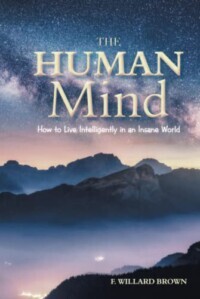Title: The Human Mind: How to Live Intelligently in an Insane World
Author: F. Willard Brown
Publisher: AuthorHouse
ISBN: 1665555319
Pages: 80
Genre: Non-Fiction
Reviewed by: David Allen
Pacific Book Review
 Read this book. If you want to live longer, live better, and help save the planet, please read this book. In the space of 80 breezy and intelligent and very accessible pages, F. Willard Brown succeeds in culling some of the most important wisdom of the past 3,000 years.
Read this book. If you want to live longer, live better, and help save the planet, please read this book. In the space of 80 breezy and intelligent and very accessible pages, F. Willard Brown succeeds in culling some of the most important wisdom of the past 3,000 years.
The book begins as follows. “Here in the 21st century, as I look out on a world of colossal ignorance and violence, what a disappointment it is that there is so little regard
for truth.” Truth – fact, not hearsay, not disinformation – is the launching point of this remarkable argument for sanity, better health, and compassionate co-existence.
The tour begins with the founding fathers of Western civilization – the ancient Greeks, who brought us philosophic discourse, mathematics, science, and the pursuit of Truth. Mankind, victim of its own blind faith and ignorance, peeks its head out from Plato’s cave with the historic arrival of scientific inquiry, and the appropriate valuation of empiricism, validity, and reproducibility. Avatars of rekindled light, including Freud and especially Darwin, helped show the way. The planet is now poised on the brink of destruction but also has the tools for remediation and renewal.
F. Willard Brown rightly places the locus for change in education. The globe cannot support 8 billion human lives; with 45,000 or more dying of starvation each day. Earth and its human inhabitants cannot sustain the ‘SAD’ (Standard American Diet – processed foods, sugar, fats, animal products) without fatal consequences to health and to the environment. Happily, the information one needs is already there, and also generously provided in Brown’s persuasive references to J. Krishnamurti (Commentaries on Living) and healthful vegan eating (I went online and bought a juicer immediately after finishing the book!) The writer also makes a very strong case for meditative practice and the self-knowledge that results.
There’s more. Our best efforts at knowledge are sometimes misplaced: the most valuable knowledge, after all, is self-knowledge. Drawing battle lines on the issue of does God exist is an exercise in futility: how can a finite being (Man) pretend to comprehend the infinite (God, the Universe?). Brown points an accusing finger at a resident evil forever among us: war, and its wellspring, nationalism. Man is the only animal that premeditates murder…and organized murder, otherwise known as war. As long as ‘countries’ and ‘nations’ vie for supremacy, no one comes out ahead. The author also slams the notion of free will – what happens to ‘free will’ when the lifelong conditioning arising from heredity and environment are factored in? Education, good or bad, is a prime component of conditioning; improving education, towards a more rational science-based society, will go a long way towards improving life on earth.
I cannot recommend this book highly enough. Everyone should read it. In one sitting, it provides a number of life-changing eminently practical prescriptions for smarter, healthier, far more intelligent living.


